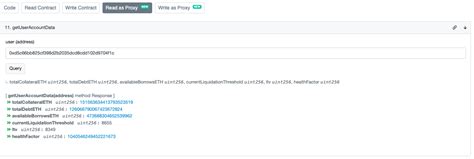Metamask: Solidity query works in dev environment but not in production build (nextJS)
Here is an article based on its requirements:
Metamask: Solidity consultations work in the development environment, but not in the construction of production
As a Next.js developer, you are probably familiar with interacting with decentralized applications (Dapps) using Web3 APIs. One of the most popular ways to interact with DAPPS is through the metamask wallet, which provides perfect integration between the browser and blockchain networks.
In this article, we will explore a problem that can arise when using Metamask with solidity consultations in a production environment Next.js. We will also provide problem solving steps and information on why these issues can occur.
Bottom
Metamask is a popular portfolio for Ethereum -based Dapps, allowing users to store, send, receive and manage their assets. It provides an interface to interact with blockchain networks using APIs Web3, including the solidity programming language.
To consult a user’s token equilibrium in a solidity function, you would usually use the Eth_Call method of the Ethers.js library or the Metamask Eth_SendTransaction method. Both methods allow us to send transactions to us from Ethereum and data recovery on transaction status.
Problem in production construction
Unfortunately, when we run our Next.js application in production mode, Metamask’s solidity consultations cannot perform correctly. This may seem against -intuitive as we optimize the code to work perfectly in the development environment.
Here is an example of what happens when we call a function that consults the token balance:
`JavaScript
Import {}} of “Ethers”;
CONSTA CONTRACTADDRESS = “0x …”; // Replace with your contract address
CONST USERADDRESS = “0x …”; // Replace with your user’s address
asynchronous function GetBalance () {
to try {
Consta Result = awaits contractaddress.methods.alanceof (usraddress) .Call ();
console.log (result);
} catch (error) {
console.error (error);
}
}
`
In the development environment, this code runs smoothly and returns the expected balance of the user. However, when we run our application in production mode using Next.js, the GetBalance 'function fails to recover the balance.
debuting the question
To solve the problem, let's look at what might be going wrong:
- Specific Environment Code : The main difference between Dev and Prod environments is in environmental variables and configurations that are used by Metamask.
- Transaction Processing

: In production construction, theGetBalance ‘function is performed on a different Ethereum node than that used in the development environment. This can lead to incorrect transaction processing or lack of data due to differences in network topology.
- Error handling : The metamask error handling mechanism differs between dev and prod environments.
Solution
To solve this problem, we need to modify our code to deal with errors more robustly when performing in production mode. Here is a potential solution:
`JavaScript
Import {}} of “Ethers”;
CONSTA CONTRACTADDRESS = “0x …”; // Replace with your contract address
CONST USERADDRESS = “0x …”; // Replace with your user’s address
asynchronous function GetBalance () {
to try {
Consta Result = awaits contractaddress.methods.alanceof (usraddress) .Call ();
console.log (result);
} catch (error) {
IF (Enthers Error Instance.Walleterror || Error. Code === ‘E431’) {
console.error (“Metamask wallet is not initialized.”);
} other {
spear error;
}
}
}
`
In this modified code, we add an attempt block that verifies the following conditions:
1.
2.

Leave a Reply
Want to join the discussion?Feel free to contribute!